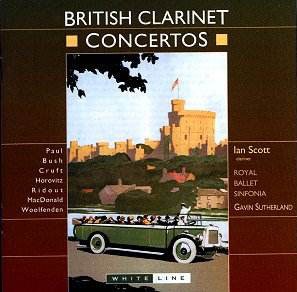The six concertos presented on this disc are
by Alan Paul, Joseph Horovitz, Guy Woolfenden, Malcolm MacDonald,
Adrian Cruft and Alan Ridout. All were composed between 1940 and
1985. Some licence with the term "concerto" has been taken, as
at least two of the works are under six minutes long. However,
the abundance of good tunes and diversity of styles, from serious
music to jazzy rhythms and a Cuban Rondo make this a most entertaining
recording. There is a "light music" feel to much of it and this
gives it an infectious "feel good" factor that makes for continuing
listening pleasure. This label, ASV Whiteline, is proving a champion
of British music of this type and is to be encouraged for providing
a welcome relief to much contemporary "serious" music. All the
composers here display great feeling for the capabilities of the
clarinet in a wide variety of moods and styles.
Alan Paul's three movement work from 1958
has a good flow to it and is well scored for the chamber orchestra
forces required, with some skilful playing from the Royal Ballet
Sinfonia soloists. The heritage of Vaughan Williams and Delius
gives this music a strong English flavour, and Ian Scott's high
register playing displays fine control.
The Concertante of Joseph Horovitz,
written in 1948 for Gervase de Peyer, is a less obviously British
work than AIan Pauls Concerto, perhaps because of Horovitz's
Viennese origins and studies with Nadia Boulanger. It is modelled
on Weber's Concertino and very skilfully shadows the original
with virtuosic writing for the soloist.
The Alan Paul Concerto and the Concerto
by Guy Woolfenden were both written for Jack Brymer.
The latter was commissioned to celebrate Jack Brymer's 70th birthday
in 1985. It is unusual in having only two movements, the first
a lyrical flowing discourse and the second a theme and variations.
Woolfenden's experience as Head of Music to the Royal Shakespeare
Company, and writing well over a hundred scores for the company's
productions, shows in some highly original scoring and subtle
rhythmic inflections. The flowing line of the first movement and
the wit and insouciance of the second are a fitting tribute to
Jack Brymer's personality and his position in the pantheon of
British wind players. Ian Scott is a worthy successor and catches
the style of this music with easy grace.
Geoffrey Bush's Rhapsody for Clarinet
and Strings dates from 1940 and shows the influence of Vaughan
Williams. It is a gentle pastoral idyll, which begins and ends
with a beautiful folk-song like melody, that seems familiar, but
is probably Bush's own. Scott's beautifully fluid runs
and his persuasive way with the long melody is seductive.
The Cuban Rondo of 1960 by Malcolm
MacDonald is a gentle amble through some Latin American rhythms
that Scott glides through with a controlled languor, ably assisted
by the Royal Ballet Sinfonia percussion section. There is nothing
stiff here, just an infectiously happy feel to the music and Scott's
evident enjoyment of it.
Adrian Crufts Concertino was premiered
in 1955 by Sidney Fell, a former principal of the London Symphony
Orchestra, whose beautiful playing was a feature of the many sound-tracks
recorded by the Sinfonia of London at Denham Studios, in the heyday
of the British film industry in the post-war decades. Cruft's
writing for the clarinet shows an intimate familiarity and a musicality
that promotes a desire for a wider knowledge of his music.
The three movement Concertino by Alan
Ridout from 1978 is a short (very!) piece that displays energy
and a good knowledge of the clarinet that makes one feel that
there is a longer and more interesting piece struggling to get
out.
Ian Scott, in his programme notes, states that
much of the music on this disc was inspired by the playing of
the great British clarinet players of the recent past. He cites
Reginald Kell, Jack Brymer, Frederick Thurston and Sidney Fell
as players whose vocal styles and freedom of expression made the
British school of clarinet playing so admired in the second half
of the twentieth century. Scott's own style is in the same mould,
with a fluid comprehensive technique, secure intonation and a
warm tone quality, with a touch of vibrato here and there that
is always in good taste. He encompasses the various moods that
these differing compositions call for with ease. As well as this,
he plays the tunes, with which these compositions abound, with
a grace and sense of style that is refreshing. Just listen to
the way that he plays the haunting tune that comes towards the
end of the variations in the second movement of Woolfenden's Concerto.
Superb.
Gavin Sutherland directs the Royal Ballet Sinfonia
with a sure touch, and the violin soloist and wind players of
this fine orchestra disport themselves with style. In all, a fine
recording and Ian Scott's infectious enthusiasm can be felt throughout.
Highly recommended.
Victor Slaymark
See also review
by Hubert Culot
